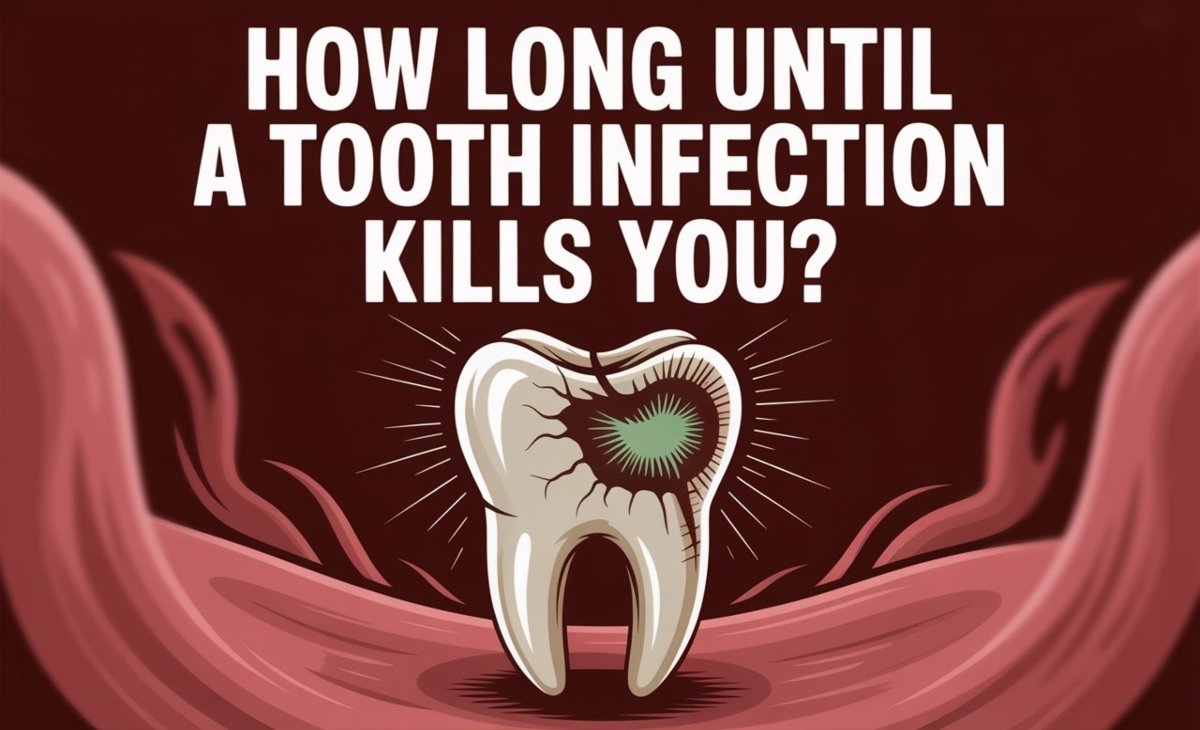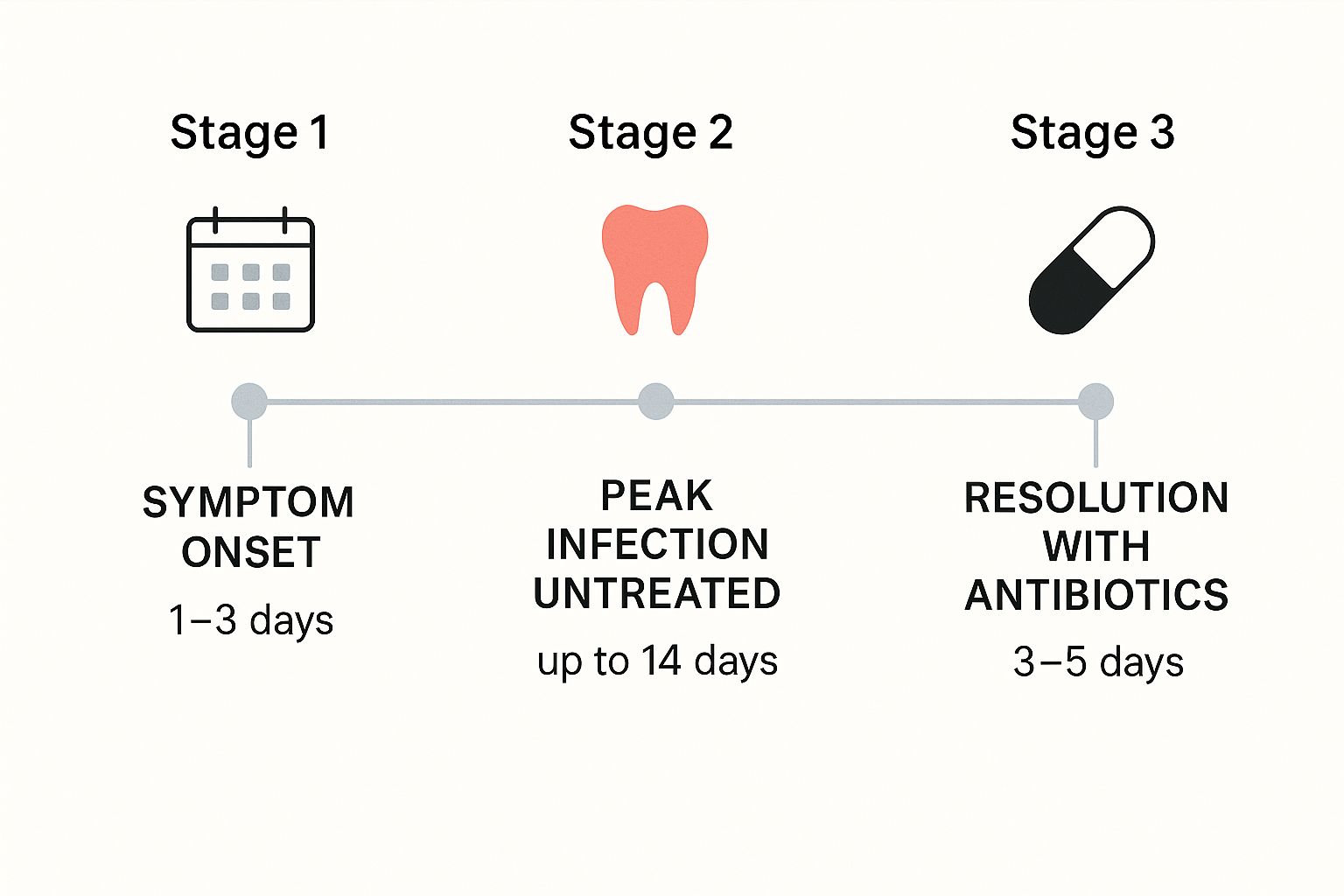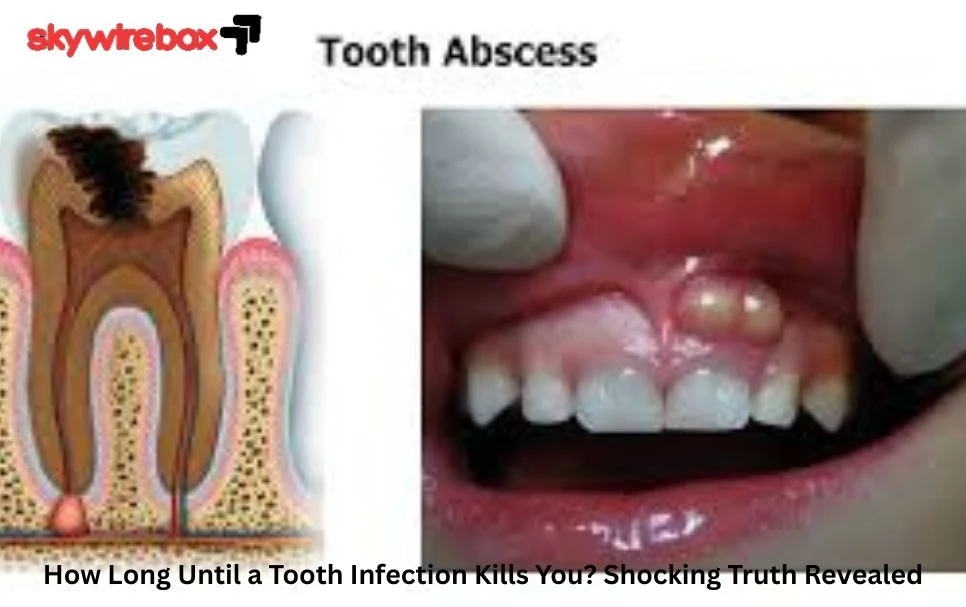A tooth infection might seem like a small problem at first, but it can quickly turn dangerous if left untreated. You might wonder, how long until a tooth infection kills you?
This question is more serious than you think. Your mouth is full of bacteria, and when an infection spreads, it can reach vital parts of your body. Understanding the risks and knowing when to act can save your life. Keep reading to learn the facts and protect yourself before it’s too late.
Tooth Infections Explained
A tooth infection is a serious dental problem that can affect anyone. It happens when harmful bacteria enter the tooth or gums. These bacteria cause pain and swelling. If left untreated, the infection can spread to other parts of the body. Understanding tooth infections helps you protect your health.
Knowing the causes, symptoms, and types of tooth infections is important. This knowledge helps you act quickly and avoid complications.
What Causes Tooth Infections
Tooth infections start from bacteria entering the tooth’s inner parts. Common causes include tooth decay, broken teeth, or gum disease. Poor oral hygiene allows bacteria to grow. Sometimes, dental procedures can also lead to infections. The bacteria multiply and cause swelling and pain inside the tooth.
Common Symptoms To Watch For
Tooth infections cause several clear symptoms. These include sharp tooth pain, swelling in the gums, and bad breath. You might also feel fever or a bad taste in your mouth. The pain can worsen when biting or chewing. Early symptoms need attention to prevent serious problems.
Types Of Tooth Infections
There are different types of tooth infections. A dental abscess is a pocket of pus caused by bacteria. Periapical abscess happens at the tooth root. Periodontal abscess affects the gums near the tooth. Both types cause pain and swelling but need different treatments. Knowing the type helps dentists choose the right care.

Risks Of Untreated Infections
Untreated tooth infections pose serious health risks. They do not just stay in your mouth. The infection can spread to other parts of your body. This can lead to dangerous health problems quickly. Knowing the risks helps you act fast.
How Infections Spread
Bacteria from a tooth infection can move through the bloodstream. The infection can reach the jaw, neck, or even the brain. It can also spread to the heart or lungs. This spread causes severe damage and can be life-threatening.
Potential Complications
Untreated tooth infections may cause abscesses, which are pockets of pus. These abscesses can break open and cause tissue damage. Infections may lead to sepsis, a deadly body-wide reaction. Brain abscess and endocarditis are other possible complications. These conditions require urgent medical care.
Signs Of Serious Infection
Watch for swelling in your face or neck. Intense tooth pain and fever are warning signs. Difficulty breathing or swallowing signals a severe infection. Confusion or dizziness may mean the infection is spreading. Seek emergency help if you notice these symptoms.
Timeline Of Infection Progression
The timeline of a tooth infection shows how the problem grows inside the mouth. Understanding this timeline helps spot danger early. The infection moves in stages, starting small and ending with serious health risks. Each stage has signs and risks that need attention.
Early Stages
The infection begins with pain and swelling near the tooth. You may feel a slight ache or sensitivity. The area around the tooth might be red and tender. At this point, the infection is still local and easier to treat. Visiting a dentist now can stop it from spreading.
Advanced Infection
The infection spreads deeper into the gums and bone. Swelling becomes worse and may affect your face. You might feel fever, tiredness, or bad breath. The pain grows stronger and harder to ignore. If untreated, the infection moves beyond the mouth. This stage needs urgent dental care to avoid serious problems.
When It Becomes Life-threatening
The infection can reach the bloodstream or brain. This causes dangerous conditions like sepsis or brain abscess. Symptoms include high fever, confusion, and difficulty breathing. At this stage, immediate hospital care is critical. Delays can lead to death. Quick treatment saves lives. untreated tooth infection
Sepsis And Tooth Infections
Tooth infections can start small but grow dangerous fast. One serious risk is sepsis. This condition happens when infection spreads into the bloodstream. It can cause life-threatening problems if not treated quickly. Understanding sepsis and its link to tooth infections is important for your health.
Recognizing sepsis early can save lives. Knowing the signs helps you act fast. This section explains what sepsis is, how tooth infections can cause it, and what symptoms to watch for.
What Is Sepsis
Sepsis is the body’s extreme response to an infection. It happens when the immune system attacks the whole body. This can cause tissue damage, organ failure, and death. Sepsis needs emergency medical care. It can develop from infections in any part of the body.
Connection Between Tooth Infection And Sepsis
A tooth infection can spread bacteria into the blood. This happens if the infection reaches the gums or bone. Once bacteria enter the bloodstream, sepsis can start. Tooth infections are common but often ignored. Untreated, they can quickly become dangerous.
Sepsis Symptoms To Recognize
Look for fever, chills, and confusion. Fast heartbeat and rapid breathing also happen. The skin may feel cold, sweaty, or pale. Severe pain or discomfort is common. If you notice these signs, seek medical help immediately.
Emergency Situations
A tooth infection can become dangerous very fast. Sometimes, it turns into an emergency. Knowing when to get help can save your life. Watch out for signs that show the infection is severe. Acting quickly is very important.
Ignoring a serious tooth infection can lead to serious health problems. The infection can spread from your tooth to other parts of your body. This can affect your brain, heart, or lungs. Understanding emergency signs helps you stay safe.
When To Seek Immediate Help
Seek help right away if your face swells a lot. Trouble breathing or swallowing is a major warning sign. A high fever that does not go down needs urgent care. Severe pain that gets worse fast is also a sign. If you feel very weak or confused, call for help.
Possible Outcomes Without Treatment
Without treatment, the infection can spread to your jawbone. This causes bone loss and severe pain. The infection can reach your bloodstream, causing sepsis. Sepsis is life-threatening and needs emergency care. Brain abscesses or heart infections can also happen. These conditions can lead to death if untreated.
Preventing Severe Tooth Infections
Preventing severe tooth infections is vital for your overall health. Tooth infections can spread quickly and cause serious problems. Taking simple steps daily can stop infections before they start. Healthy habits protect your smile and your life.
Daily Oral Hygiene Tips untreated tooth infection
Brush your teeth twice every day. Use fluoride toothpaste for strong teeth. Floss daily to remove food stuck between teeth. Avoid sugary snacks that feed harmful bacteria. Rinse your mouth with water after meals to clear debris. These habits reduce bacteria and lower infection risk.
Importance Of Regular Dental Visits
Visit your dentist every six months. Dentists catch problems early before they worsen. Professional cleanings remove plaque that brushing misses. Dentists check for signs of infection or decay. Early care saves teeth and prevents pain. Regular visits keep your mouth healthy and safe.
Early Treatment Options
See a dentist at the first sign of pain. Infections often start with mild discomfort or swelling. Early treatment stops infection from spreading. Dentists may prescribe antibiotics or drain abscesses. Timely care prevents serious complications. Do not ignore tooth pain or swelling.
Medical Treatments For Tooth Infections
Tooth infections can become serious quickly. Medical treatments aim to stop the infection and save your health. Knowing the options helps you act fast and avoid risks.
Doctors use different methods depending on how bad the infection is. Treatment focuses on killing bacteria and removing infected tissue. Let’s explore the main medical treatments for tooth infections.
Antibiotics And Their Role
Antibiotics fight the bacteria causing the infection. They help reduce pain and swelling. Doctors often prescribe them as the first treatment step.
Antibiotics alone may not cure severe infections. They work best with other treatments like drainage or tooth removal. Always finish the full course to prevent resistance.
Surgical Interventions
Surgery removes infected material and relieves pressure. Common procedures include draining abscesses or extracting damaged teeth. Surgery stops the infection from spreading to other parts.
Minor surgery is usually done under local anesthesia. More serious infections may require hospital care. Quick surgery can save your life in extreme cases.
Follow-up Care
After treatment, follow-up visits are crucial. Doctors check healing progress and signs of returning infection. They may take X-rays to see inside the tooth area.
Good oral hygiene and regular dental visits prevent new infections. Follow all doctor advice to ensure full recovery. Early treatment avoids dangerous complications. untreated tooth infection


Frequently Asked Questions
How Long Can A Tooth Infection Go Untreated?
A tooth infection can worsen within days if untreated. Severe complications or death may occur in weeks, especially if it spreads. Immediate dental care is crucial to prevent serious health risks.
Can A Tooth Infection Cause Life-threatening Conditions?
Yes, a tooth infection can lead to life-threatening conditions like sepsis. If bacteria enter the bloodstream, it can cause widespread infection. Prompt treatment is essential to avoid these severe outcomes.
What Are Early Signs Of A Dangerous Tooth Infection?
Early signs include severe toothache, swelling, fever, and difficulty swallowing. These symptoms indicate the infection may be spreading. Seeking dental care quickly can prevent complications.
How Is A Severe Tooth Infection Treated?
Severe infections are treated with antibiotics and dental procedures like root canals or extractions. In extreme cases, hospitalization may be necessary. Early treatment reduces risks of serious health problems.
Conclusion
A tooth infection can become very dangerous if ignored. It can spread to other parts of the body quickly. Early treatment stops serious problems. Watch for pain, swelling, or fever. See a dentist as soon as possible. Do not wait for symptoms to get worse.
Taking care of your teeth helps prevent infections. Stay alert and act fast to protect your health.
Our all updete get to visit our website: skywirebox








